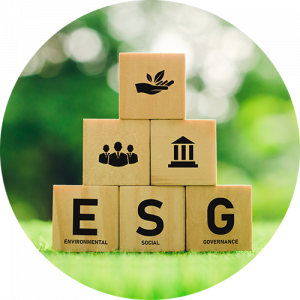ESG – the three dimensions of sustainability
Family businesses need to actively address this mega issue
About two years ago, I received a call from the CEO of a listed family company: Would we have experience in identifying and evaluating top managers in the ESG environment? They wanted to expand their board accordingly – preferably with a woman.
ESG – I had heard of it before. After a quick google, I remembered what ESG stood for: The application of sustainability criteria in corporate management.
A lot has happened since then. ESG is now a global mega-topic, and there are probably very few boards of directors, management teams and supervisory bodies that have not at least discussed ESG criteria and their relevance for their own company. In our firm, ESG has developed into a major topic and we have brought on board a new colleague, Eva Schulz-Kamm, who specializes in this area and whose expertise is particularly in demand at the moment.
The basic characteristics of sustainable management
There are various definitions of sustainability, and it is clear that they do not always mean the same thing for companies operating in different industries, regions and stages of development. Basically, sustainability in a business context encompasses these three dimensions: Environmental, Social and Governance.
In other words, it is the framework for responsible, corporate action that reconciles social and environmental concerns in business operations. This is also linked to a responsible corporate attitude in planned investments, i.e., “socially responsible investing”. In principle, ESG affects all areas of a business, from the supply chain and production, to sales and marketing, to finance and HR.
No more ducking
More and more corporate leaders are confronted with the fact that ‘stakeholders’ – which today means employees, customers, suppliers, shareholders, regulators, and ‘society’ in general – expect them to actively contribute to solving global challenges. Companies can no longer try to duck the consequences of this issue, or just make polite statements without any action. The bar for corporate leaders is now higher and they are expected to take responsibility – not only for their company´s financial performance but also for societal goals, for a better world.
Today, leadership at the top level also includes responsibility for developing and implementing an ESG strategy: to position companies as leading providers of sustainable, responsible, and innovative products and services – and to demonstrate exemplary corporate governance. This is by no means about being an altruistic do-gooder, let alone turning away from profit motives. The top priority of an ESG strategy is to enhance corporate performance by entering new markets and expanding existing ones, and to minimize reputational, regulatory, legal, and financial risks. In addition, it aims to strengthen relationships with policymakers and civil society representatives, particularly in the home country, but also in key markets for sourcing, production, or sales. Finally, the ESG strategy must be meaningful and transformative so that management and employees can understand, embrace, and ultimately implement it.
Beyond climate change
‘Decarbonization’ is the top ESG issue. It is strategically highly relevant – and carries significant risks. Transformations towards climate neutrality require holistic and transparent approaches at the corporate management level. Looking ahead, products and services need to be reviewed, as do production processes and the working environment along the entire value chain. Singular CO? targets alone are not enough; the path to achieving them must be backed up by quantifiable milestones.
Shareholders, especially from the ‘Next Generation’, are increasingly making sustainability a hard investment criterion. Consumers want to buy products and services that are as sustainable as possible. Top talents want to work for companies that have a clear sustainability-orientation as part of their ‘purpose’ – and expect employers to help eliminate injustices around the world. Moreover, regulators are increasingly sanctioning unsustainable business practices.
Many people expect that entrepreneurs, too, will take on a leadership and creative role in overcoming the enormous challenges such as climate change. In any case, this fundamental transformation within companies must be steered and fuelled from the top. As a consequence, this quickly becomes a question of company owners´ and top executives´ own attitude – and leadership. There are three interrelated areas of action here. First, the foundation must be laid, and sustainability must be anchored in leadership skills and culture. Then there should be a plan for how to align sustainability priorities with the core business. And finally, the transformation and desired change must be enabled through intensive communication of the goals in all directions – and the encouragement of all stakeholders.
Challenges in an interconnected world
NGOs, activists, and influencers are spreading the news of actual (or perceived) corporate misconduct via social media at breakneck speed all over the world. Employees not only demand secure and well-paid jobs, but also expect a sense of purpose, new forms of work, and ethically sound forms of corporate governance. Customers use their consumer power to initiate morally-grounded boycotts via the Internet, which can cause entire sales markets to collapse. Investors demand not only attractive returns, but also diversity in management and sustainability in strategic orientation. On the capital markets, there is a clear shift toward environmentally and socially responsible investments. This is measured by specific ESG criteria. Investors increasingly include these in their analysis of securities, evaluating and taking into account the social, ecological and ethical consequences of investments made by companies and governments.
Public authorities are reacting
And ‘the state’ is actively getting involved itself. The EU Commission has set legal requirements for ESG-compliant business (“EU taxonomy”): From January 2022, the proportion of a company’s sales or investments that can be classified as “eco¬sustainable” according to fixed criteria must be reported. In Germany, for example, the hurdles for sustainability reporting are rising: From 2023, the Supply Chain Act obliges companies to monitor their global value chains in detail with regard to social and environmental standards – otherwise, they could face fines and exclusion from public contracts. Many corporate executives complain that their immediate environment has become louder, more demanding, and more complex, and that ‘the pressure of expectations’ has increased dramatically. And the business pressure, in any case, is rising along with it.
Sustainability from the investor’s perspective
Activist funds and debt investors, insurers and business partners are demonstrably demanding sustainability and, first and foremost, the accelerated decarbonisation of business models. Threats are being made to end relationships, place new boards, and halt new financing: Climate neutrality is becoming the new triple-A rating.
Sustainability has become a must-meet performance metric in its own right. Larry Fink, the CEO of Blackrock, the world’s largest asset manager, has been writing Christmas messages to the CEOs of the largest American and European companies for many years. The recent demands – for more long-termism, genuine sustainability and responsible behaviour – have been remarkable. In the meantime, other major institutional investors have also turned into true ESG advocates and are making specific demands of company CEOs.
What companies need to consider
Family businesses and medium-sized entrepreneurs – in addition to understanding the need for the change in thinking – have to muster the courage and foresight to place sustainability at the centre of their own company’s strategy. This is not something that can be taken for granted. Especially when their companies are neither listed nor particularly visible, it is challenging. Where companies have not yet been directly targeted by activists, or been fortunate enough to avoid a bad press, the pressure to act may not be felt. After all, ‘hidden champions’ are often just that: hidden, silent, acting modestly and hoping to avoid outside scrutiny.
However, the belief still widespread among some entrepreneurs that SMEs and start-ups can sit out ESG reporting obligations after January 1, 2021 – because they sit below the current legal threshold of 500 employees – is risky. The days when strict requirements only applied to large corporations in the spotlight of the capital markets are over. Financial institutions, investors and customers are paying attention to ESG criteria or aligning their investments with them, increasing the pressure on companies to disclose non-financial metrics regardless of size. The capital markets are thus becoming drivers of structural change in the real economy. The worse the rating, the more expensive the loan; in some cases, financing is no longer available for unsustainable investments. This continues in the supply chain. As suppliers, SMEs will have to prepare for more extensive reporting and disclosure obligations to their customers. Some companies are already thinking ahead here and are documenting their sustainability along the entire supply chain – in wise anticipation of future legislation e.g. in Germany and, in the future, throughout the EU.
Recognizing the megatrend and becoming a “change agent”
Employees, top talents, customers, suppliers, financiers – in the long term none of them will tolerate a corporate management that is unwilling or unable to advance the organization in the direction of sustainability. In our view, this requires the ability to successfully master the challenges, some of which are completely new, of transitioning to a sustainable business model. Only then will the organisation be able to manage the transformation to and attract the new talent it needs to build its future. To meet this challenge as a family business owner, it is essential to become a “change agent” – and rally leaders around you to help drive the sustainability agenda.
We meet many business leaders in family businesses and SMEs who have good ‘antennae’ and enough humility to really listen, especially to their younger employees. Their attitude and sense of responsibility for future generations usually also include putting their own business models and business practices to the test. For them, sustainability has always meant taking responsibility for the long term. With ESG as a megatrend, they now have a chance to lead their organisations and their employees into a future that is more hopeful, more viable and more just – and, in the process, also more value-creating.
As a management consulting firm specifically for family business owners and long-term financial investors, AvS – International Trusted Advisors is determined to play a leading role in identifying and evaluating the true leaders who can responsibly drive the evolution to sustainability in our clients’ companies.




